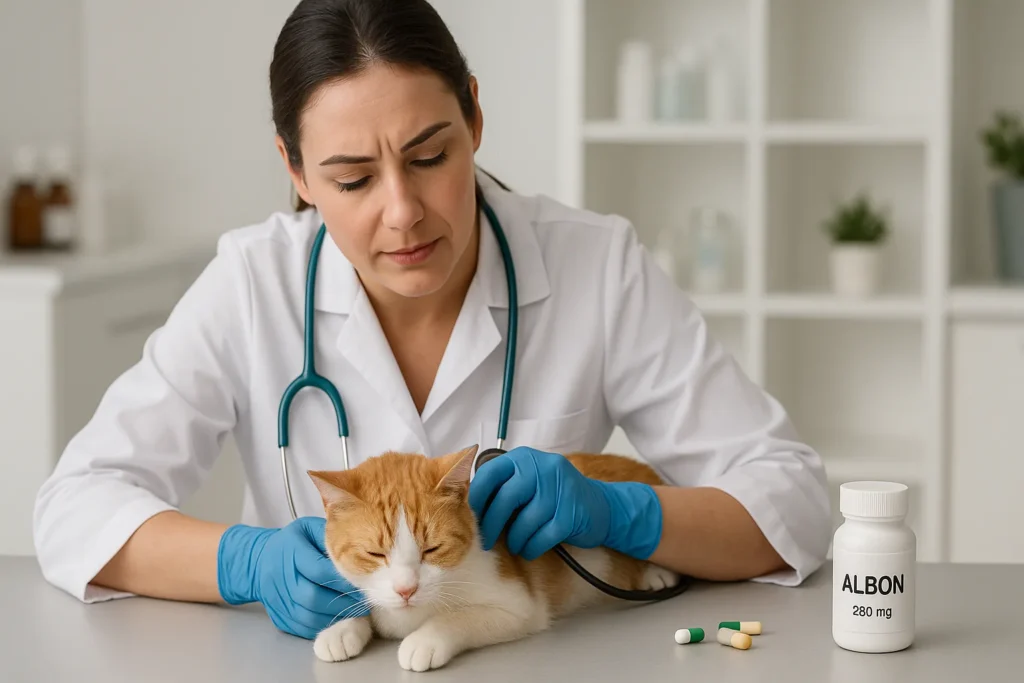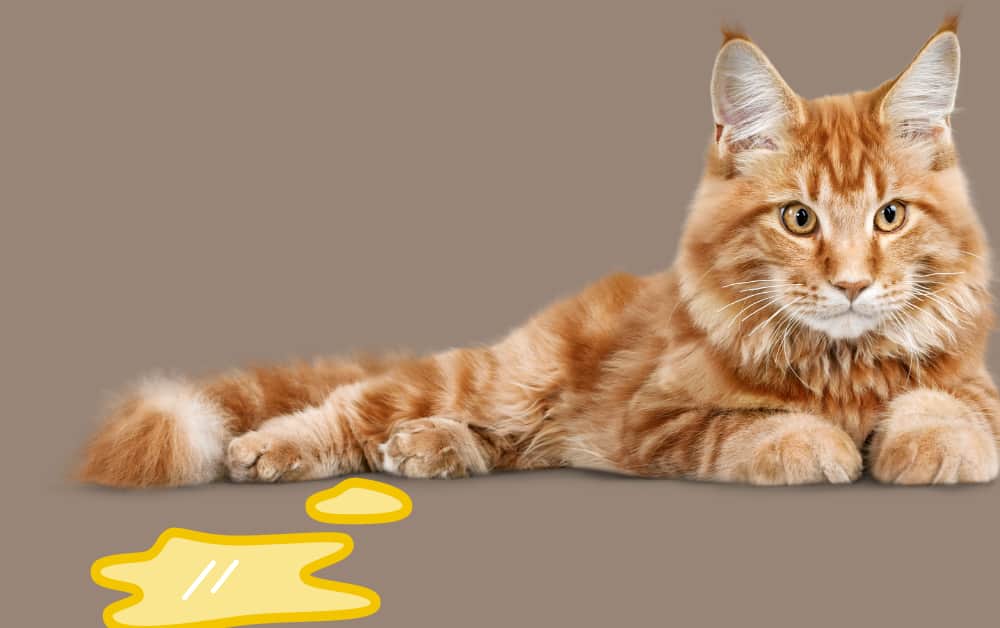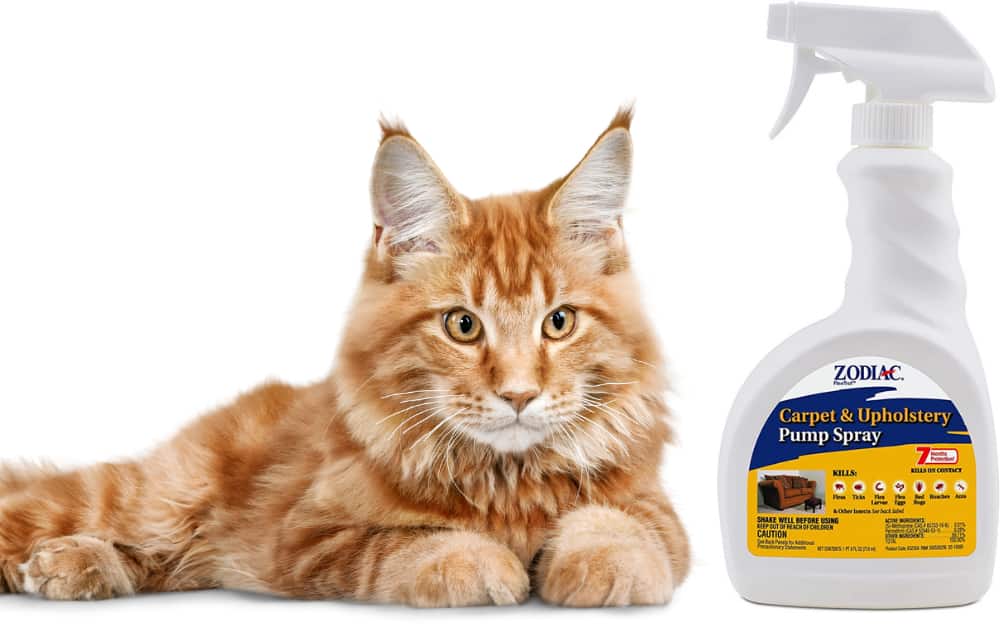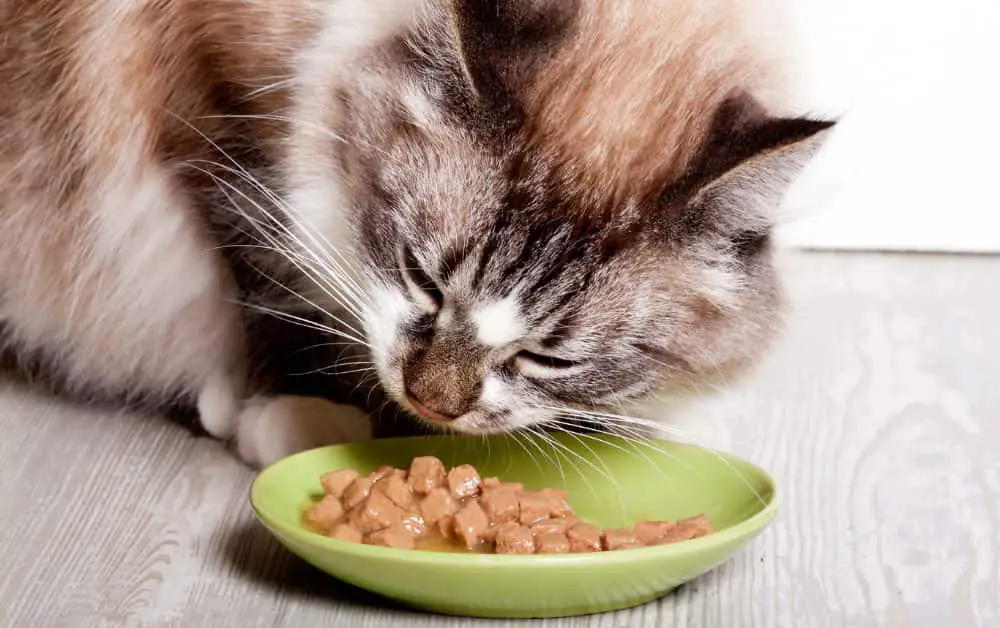When your furry little buddy starts showing signs of illness, especially something like diarrhea or unusual fatigue, your vet might suggest a medication called Albon. And if you’re like most pet parents, your next move is a deep-dive into the internet what is this drug and what is the safe Albon dosage for cats?
That’s exactly why we’re breaking it all down for you right here.
What Is Albon® For Cats?
Albon is the brand name for sulfadimethoxine, a sulfonamide antibiotic that has been around for decades. It’s most commonly prescribed in veterinary medicine for its effectiveness against a wide range of bacterial infections, particularly those affecting the gastrointestinal tract.
Sulfadimethoxine works by inhibiting the growth of bacteria. It does this by interfering with the bacteria’s ability to produce folic acid—a nutrient essential for their survival. Since animals like cats don’t rely on that same bacterial folate production, the drug effectively stops the infection without harming the host.
But make no mistake Albon isn’t a cure-all. It specifically targets certain protozoal infections, like coccidia, a common parasite that infects the intestinal lining of cats and kittens. It’s also used as part of combination therapy in more severe infections, but that’s always under a vet’s supervision.
Albon Dosage For Cats
The initial dose of Albon® for cats is 25 mg per pound of body weight, which is approximately 1 teaspoon of the liquid suspension per 10 lbs of body weight. After the first dose, the maintenance dose is reduced to 12.5 mg per pound (or ½ tsp per 10 lbs), given once daily for 3 to 4 days or as directed by a veterinarian.
Always follow your vet’s instructions to ensure proper treatment and avoid under- or overdosing.
Albon Dosage Chart for Cats by Weight
| Cat Weight (lbs) | Initial Dose (Day 1) | Maintenance Dose (Days 2-4) |
|---|---|---|
| 5 lbs | 2.5 mL (½ tsp) | 1.25 mL (¼ tsp) |
| 10 lbs | 5 mL (1 tsp) | 2.5 mL (½ tsp) |
| 15 lbs | 7.5 mL (1½ tsp) | 3.75 mL (¾ tsp) |
| 20 lbs | 10 mL (2 tsp) | 5 mL (1 tsp) |
Note: Dosages are based on Albon liquid suspension (50 mg/mL). For tablets, consult your vet for accurate dosing. Always complete the full course of treatment to ensure effectiveness.
Common Uses Of Albon In Cats
One of the top reasons vets prescribe Albon is to treat coccidiosis, an intestinal disease caused by the coccidia parasite. If your cat has it, you’ll likely notice signs like watery or bloody diarrhea, vomiting, weight loss, and general fatigue.
This infection is especially common in kittens or cats with weakened immune systems. Albon doesn’t kill the parasites outright, but it slows down their growth, giving the immune system a chance to catch up and clear the infection on its own.
Cats usually start feeling better within a couple of days of starting Albon, but it’s vital to complete the entire course even if symptoms seem to improve. Stopping early could let the infection return even stronger.
Other Infections Albon May Treat
Beyond coccidiosis, Albon may also be used in treating:
- Toxoplasmosis (in rare off-label cases)
- Respiratory infections caused by susceptible bacteria
- Skin infections in combination with other antibiotics
- Urinary tract infections
It’s important to note that Albon is not effective against viral or fungal infections, so it should only be used when your vet is confident that bacteria or protozoa are the culprits.
Albon® For Cats Forms
- Tablets: Usually come in 125 mg and 250 mg strengths. Ideal for adult cats who don’t mind pill pockets or manual administration.
- Liquid Suspension: Perfect for kittens or picky cats. Comes in a banana-flavored syrup (yes, banana!) to make things a little easier.
Each form has its own dosing quirks, so don’t switch between them without consulting your vet.
Administration Tips For Cat Owners
Administering Albon to cats is like convincing a toddler to eat broccoli it takes finesse. The easiest way to get your cat to take Albon depends on the form:
- Liquid suspension: Use a syringe to place the dose into the corner of your cat’s mouth. Follow with a treat or a favorite food.
- Tablets: Use a pill popper or hide the pill in a soft treat or cheese. Follow up with water or a lickable snack to help it go down.
Timing is also key try to give the medication at the same time each day to maintain steady levels in your cat’s system. For tips on successful dosing, see this guide on administering pet medications.
Tricks To Reduce Stress During Administration
- Wrap your cat in a towel like a burrito to keep those claws at bay.
- Use calming pheromones or treats to ease anxiety before medication time.
- Always reward with praise, pets, or a treat afterward to make it a positive experience. Learn more about positive reinforcement techniques for cats here.
Side Effects of Albon in Cats
Like any medication, Albon can come with a few minor side effects. Most of these are temporary and not particularly alarming, but it’s always best to keep a close eye on your cat during treatment. Common mild side effects include:
- Loss of appetite
- Mild diarrhea or constipation
- Lethargy or tiredness
- Vomiting
- Excessive salivation (especially with the liquid form)
These symptoms often improve within a couple of days as your cat adjusts to the medication. If they persist, however, it might be a sign that your cat isn’t tolerating the drug well.
A good rule of thumb? If your cat is eating, drinking, and generally acting like themselves despite some minor tummy issues, you’re likely in the clear. But if they’re hiding, not eating, or showing any unusual behavior, don’t wait—call your vet.
Severe Reactions and Allergies
Although rare, some cats may have allergic reactions or more serious adverse effects to Albon. Signs of a potentially dangerous reaction include:
- Swelling of the face or limbs
- Hives or skin rashes
- Trouble breathing or wheezing
- Severe vomiting or diarrhea
- Seizures or collapse
These are medical emergencies. If you spot any of these symptoms, stop the medication immediately and contact your veterinarian or an emergency animal clinic.
You May Also Like To Read:
Drug Interactions and Precautions
Albon isn’t usually given in isolation many felines with infections are on multiple meds at once. But combining drugs without checking for interactions is a risky move. Here are a few common drugs that may have interactions with Albon:
- Warfarin or other blood thinners – May increase the risk of bleeding.
- Methotrexate – Can amplify toxicity levels.
- Diuretics (like furosemide) – Can increase the chance of kidney damage.
- Other sulfa drugs – Could enhance the risk of allergic reactions or toxicity.
Always give your vet a full rundown of what your cat is taking—including supplements and herbal remedies—before starting Albon.
When Albon® Should Be Avoided in Felines
Albon® might not be suitable for every feline. It should be used cautiously or not at all in:
- Pregnant or lactating cats – There’s limited data on fetal safety.
- Cats with liver or kidney disease – The drug is metabolized and excreted through these organs.
- Cats with known sulfa drug allergies – This one’s a big no-go.
If your cat falls into one of these categories, your vet may suggest alternative treatments or adjusted dosing.
How Long Does It Take for Albon to Work?
One of the most common questions from pet parents is: “How fast does this stuff kick in?” While every cat is different, most owners notice improvement within 24 to 72 hours of starting Albon, especially if it’s being used to treat coccidiosis.
Here’s a rough timeline:
- Day 1: Diarrhea may still be present; energy levels may be low.
- Day 2-3: Stool starts to firm up, appetite improves.
- Day 4+: Cat returns to normal behavior, but still continue full course!
The trick is not to stop the medication early just because symptoms have improved. That’s like quitting antibiotics mid-way through—you risk the infection roaring back even stronger.
When to Contact a Vet
If you don’t see any improvement after 3–4 days, or if symptoms get worse, it’s time to call the vet. Likewise, if side effects are interfering with eating, drinking, or mobility, a change in treatment might be needed.
Monitoring Your Cat During Albon® Treatment
During your cat’s treatment with Albon, it’s helpful to keep a treatment journal. Yep, we’re talking daily notes on things like:
- Food and water intake
- Stool consistency and frequency
- Any vomiting or nausea
- Mood or activity level
- Any signs of discomfort or pain
This info is pure gold for your vet if anything goes sideways—or even if you just want reassurance everything’s on track.
Veterinary Follow-Up and Testing
Depending on the type of infection, your vet may want to do a follow-up fecal test to confirm that the infection is fully cleared. Especially in the case of coccidia, a negative test is the best signal that your cat is truly out of the woods.
If your cat has pre-existing conditions or shows signs of liver or kidney strain, blood tests may also be ordered to monitor organ function while on Albon.
Alternatives to Albon for Cats
While Albon is a go-to for coccidia, it’s not the only option out there. Alternatives may be considered based on tolerance, availability, or specific medical history. Some common ones include:
- Ponazuril – Another antiparasitic, often used off-label for coccidiosis.
- Trimethoprim-sulfamethoxazole (Bactrim) – An alternative sulfa drug for bacterial infections.
- Clindamycin – More effective for toxoplasmosis.
- Metronidazole – Better suited for anaerobic bacterial infections and protozoa like Giardia.
These medications come with their own sets of instructions and risks, so never switch on your own—always consult your vet first.
Natural and Supportive Therapies
Some owners look into natural remedies or supplements to support gut health during or after treatment. These aren’t a substitute for antibiotics, but they can help with:
- Probiotics to restore healthy gut flora
- Pumpkin puree for fiber and digestion
- Hydration supplements if your cat is losing fluids
Still, be cautious—“natural” doesn’t always mean “safe,” especially in cats. Run every supplement past your vet before introducing it.
Can Albon Be Used in Kittens?
Kittens are especially vulnerable to parasites like coccidia, making Albon a frequent prescription for the youngest members of your feline family. However, dosing kittens isn’t just a scaled-down version of what you’d give an adult cat—it requires precision, care, and frequent monitoring.
Because kittens are still developing, their livers and kidneys are not as efficient at metabolizing and excreting medications. This means the risk of side effects is slightly higher, particularly if the dosing isn’t exact.
Most vets will opt for the liquid suspension form of Albon for kittens since it’s easier to adjust the dose based on their ever-changing weight. They may also recommend:
- Shorter treatment durations
- Daily weight monitoring
- Probiotic support to prevent gastrointestinal upset
Always double-check the dosage and never use leftover Albon from another pet, even if they’re the same age or size.
Importance of Hydration and Nutrition
Young cats on Albon should be monitored closely for signs of dehydration or loss of appetite. Supporting them with wet food, kitten milk replacer, or a hydration supplement can help avoid complications.
Even if your kitten seems to bounce back quickly, don’t skip follow-up tests—coccidiosis, for example, can become chronic if not fully eradicated.
Storage and Shelf Life of Albon®
Proper storage ensures Albon retains its effectiveness throughout the course of treatment. Here’s how to keep it in tip-top shape:
- Liquid Suspension: Store at room temperature, away from direct sunlight and extreme heat. Do not refrigerate unless the label specifically instructs you to.
- Tablets: Keep in the original bottle with the cap tightly sealed. Store in a cool, dry place.
Avoid moisture, high humidity, or leaving the medication out in the open. A medicine cabinet or a closed kitchen drawer works best.
Checking for Expiration and Quality
Albon usually has a shelf life of 1-2 years, but it’s still smart to check the expiration date every time before use. If you notice any changes in color, consistency, or smell (especially in the liquid), don’t risk it—toss it and get a fresh supply.
Expired or improperly stored medication may not only be ineffective but could be harmful to your cat.
What to Do If You Miss a Dose
We get it—life gets hectic, and sometimes you miss a dose. Don’t panic. If you remember within a few hours, just give the missed dose as soon as possible. If it’s almost time for the next dose, skip the missed one and continue the regular schedule.
Do not double the dose to “make up for it.” That’s a fast track to overdosing and potential complications.
Consistency is crucial with antibiotics, so setting reminders on your phone, using a whiteboard, or even a pet medication app can help keep you on track.
When to Call the Vet
If you’ve missed multiple doses or your cat vomits shortly after taking the medication, it’s worth checking in with your vet. They might adjust the treatment plan or extend the duration to ensure the infection is fully treated.
FAQs
Can I use leftover Albon from my other cat?
No. Even if your cats are the same weight, the infection and individual health status may differ. Always consult your vet.
Is it safe to use Albon long-term?
Albon is typically used short-term (5–10 days). Long-term use may increase the risk of kidney issues or antibiotic resistance.
Can I mix Albon with my cat’s food?
You can, but it’s not recommended unless your vet approves. It may reduce the effectiveness if your cat doesn’t finish their meal.
What if my cat spits out the liquid Albon?
Try using a syringe to squirt it into the side of the mouth, or ask your vet about switching to tablets.
Will Albon prevent future infections?
No. It treats existing infections but doesn’t offer immunity. Clean litter boxes, isolate infected pets, and maintain good hygiene to prevent recurrence.
Conclusion
Albon can be a lifesaver for cats battling bacterial or protozoal infections, especially common culprits like coccidia. But it’s not a drug to take lightly. Understanding the correct dosage, potential side effects, and proper administration is crucial to ensuring your cat recovers quickly and safely.
From tiny kittens to adult rescue cats, Albon has proven its worth as a go-to treatment—when used responsibly. Keep a close eye on your cat’s symptoms, follow your vet’s guidance to the letter, and don’t hesitate to ask questions if anything feels off.
Being a proactive, informed cat parent is the best way to make sure your furball gets back to feeling their purring best.












